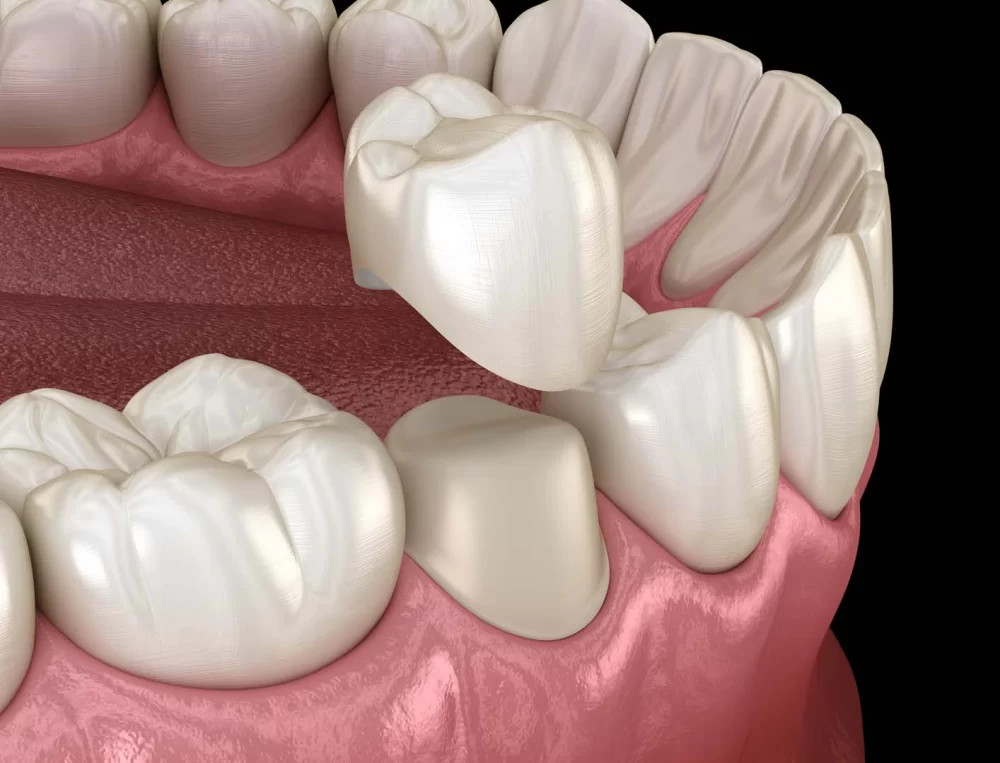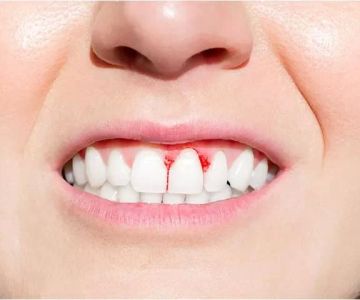
The Importance of Dental Crowns: Key Benefits and Why They're Essential for Oral Health
Dental crowns are one of the most commonly used solutions in restorative dentistry. Whether you're dealing with a damaged tooth, a large cavity, or even a tooth that has undergone a root canal, a dental crown can help restore your tooth's strength and appearance. But why exactly are dental crowns so important, and how do they benefit your overall oral health? In this article, we’ll explore the crucial role dental crowns play in maintaining a healthy smile and how they contribute to long-term dental care.
1. What Are Dental Crowns and How Do They Work?
A dental crown is a cap that is placed over a tooth to restore its shape, size, strength, and appearance. Crowns can be made from various materials, including porcelain, metal, or a combination of both. The crown covers the entire visible part of the tooth and is cemented into place, providing protection for the underlying tooth structure. Crowns are often used when a tooth is too damaged to be repaired with a filling alone, or after a root canal procedure to reinforce a weakened tooth.
In essence, dental crowns act as a protective shell that helps preserve the integrity of the tooth beneath. This is why they are a popular solution for patients with broken, decayed, or compromised teeth.
2. Why Are Dental Crowns Important for Oral Health?
Dental crowns are vital for a variety of reasons, especially when it comes to ensuring long-term oral health. Here are a few of the main reasons why crowns are important:
Protection of Weakened Teeth
If you have a tooth that has been severely weakened due to a large cavity or a root canal, it can become more susceptible to further damage or fractures. A crown acts as a barrier to protect the tooth from additional stress and damage. By reinforcing the tooth, a crown helps maintain its function and prevents the need for more invasive treatments in the future.
Restoring Function
Teeth that are damaged or decayed often lose their ability to function properly, making tasks like chewing and biting difficult. Crowns restore the tooth's original shape, size, and strength, allowing you to chew and speak comfortably. This helps you maintain good nutrition by allowing you to enjoy a variety of foods without discomfort or difficulty.
Improved Aesthetic Appearance
One of the most important benefits of dental crowns is the improvement in the appearance of your smile. If you have a tooth that is discolored, cracked, or misshapen, a crown can cover the tooth and restore its natural look. Porcelain crowns, in particular, are designed to mimic the appearance of natural teeth, making them an excellent choice for visible teeth such as those in the front of your mouth.
Preventing Further Decay
A dental crown can help seal off a decayed tooth and prevent bacteria from entering and causing further decay. Once a tooth has been filled or treated for a cavity, a crown can provide additional protection by covering the tooth completely. This reduces the likelihood of the cavity spreading or causing additional damage.
3. Types of Dental Crowns
There are several different types of dental crowns available, each with its own set of advantages. The choice of crown depends on factors like the location of the tooth, the patient's personal preferences, and the specific dental issue being addressed. Here are the most common types of dental crowns:
Porcelain Crowns
Porcelain crowns are known for their natural appearance and are often used for visible teeth. These crowns are custom-made to match the color and texture of your natural teeth, making them ideal for front teeth. They are durable, stain-resistant, and blend seamlessly with your smile. However, porcelain crowns may not be as strong as metal crowns, so they are typically used in areas that do not undergo excessive pressure from chewing.
Metal Crowns
Metal crowns are made from alloys, such as gold or silver, and are extremely durable. They are typically used for back teeth where they will not be easily seen. Although they may not be aesthetically pleasing, metal crowns offer excellent strength and can withstand the pressure from chewing. These crowns are a great option for patients who need a crown for molars and want long-lasting durability.
Porcelain-Fused-to-Metal Crowns
Porcelain-fused-to-metal crowns combine the best of both worlds. The inner structure is made of metal, which provides strength, while the outer layer is made of porcelain to mimic the appearance of natural teeth. These crowns are commonly used for both front and back teeth, as they offer a good balance of durability and aesthetics.
Resin Crowns
Resin crowns are typically more affordable than porcelain or metal crowns. However, they are not as durable and may wear down over time. These crowns are best suited for temporary solutions or for patients who are looking for a cost-effective option.
4. The Dental Crown Procedure
Getting a dental crown typically requires two visits to your dentist. During the first visit, your dentist will examine the tooth and take X-rays to assess the extent of the damage. The tooth will then be cleaned, shaped, and prepared to accommodate the crown. If the tooth is decayed or damaged, your dentist may need to remove a portion of the tooth to create space for the crown.
Once the tooth is prepared, an impression is made to create a custom crown that fits perfectly. The impression is sent to a dental lab where the crown is crafted. In the meantime, a temporary crown may be placed to protect the tooth.
During the second visit, the temporary crown is removed, and the custom crown is placed on the tooth to ensure a proper fit. Your dentist will make any necessary adjustments and then permanently cement the crown into place. The entire process typically takes a few weeks from start to finish.
5. The Benefits of Choosing a Dental Crown
Dental crowns offer a variety of benefits that make them an essential part of restorative dentistry. Not only do they restore the function and appearance of your teeth, but they also provide long-lasting protection. With proper care, crowns can last for many years, allowing you to maintain a healthy and beautiful smile. Whether you're dealing with a decayed tooth, a cracked tooth, or a tooth that has undergone a root canal, a dental crown is an effective solution that helps preserve your oral health.
6. Real-Life Story: A Patient’s Experience with Dental Crowns
Jessica, a 32-year-old mother of two, found herself in need of a dental crown after a severe cavity had compromised one of her molars. The cavity was so large that a filling alone wouldn’t suffice, and Jessica was concerned about the possibility of losing the tooth altogether. Her dentist recommended a crown to restore the tooth’s strength and function.
Jessica chose a porcelain crown for her molar, as it was a visible tooth, and she wanted something that looked as natural as possible. After the procedure, she was amazed at how comfortable and seamless the crown felt. Not only did the crown restore the function of her tooth, but it also gave her back her confidence when smiling. Today, Jessica continues to care for her crowns with regular checkups, and her smile remains beautiful and functional.
Dental crowns offer countless benefits for anyone in need of tooth restoration. By choosing the right type of crown for your specific needs and working closely with your dentist, you can ensure that your smile remains strong, healthy, and beautiful for years to come.







 Westgate Dental Arts
Westgate Dental Arts Coventry Family Dental
Coventry Family Dental Familia Dental
Familia Dental Dr. Daniel S. Fife, DDS
Dr. Daniel S. Fife, DDS Dentistry At Suburban Square: Michael I. Wollock, DMD
Dentistry At Suburban Square: Michael I. Wollock, DMD Comfort Care Dental
Comfort Care Dental The Importance of Oral Health Education During Pregnancy for a Healthy Pregnancy
The Importance of Oral Health Education During Pregnancy for a Healthy Pregnancy Why Skipping Dental Checkups Can Lead to Bigger Oral Health Problems
Why Skipping Dental Checkups Can Lead to Bigger Oral Health Problems Advantages of Porcelain Dental Restorations
Advantages of Porcelain Dental Restorations Best Tips for Brushing Your Teeth Properly for Healthy Gums: Essential Techniques for Oral Health
Best Tips for Brushing Your Teeth Properly for Healthy Gums: Essential Techniques for Oral Health How Can Diabetes Cause Tooth and Gum Problems? Preventing and Managing Oral Health Issues
How Can Diabetes Cause Tooth and Gum Problems? Preventing and Managing Oral Health Issues Healthy Habits for Promoting Good Oral Health and Hygiene: Tips for a Healthy Smile
Healthy Habits for Promoting Good Oral Health and Hygiene: Tips for a Healthy Smile